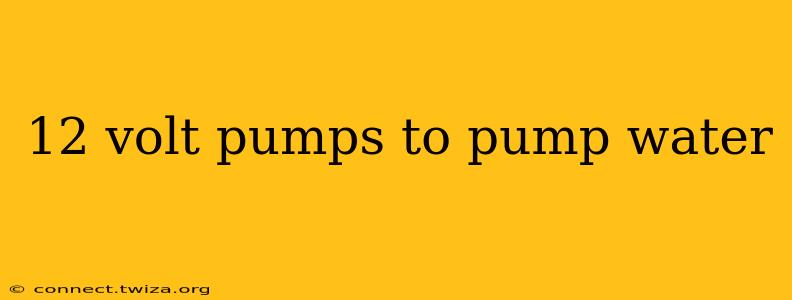Finding the right 12-volt pump for your water needs can feel overwhelming with the sheer variety available. This guide will help you navigate the options, understand the different types, and choose the best pump for your specific application. Whether you're setting up a water system for your RV, boat, or a remote cabin, understanding the nuances of 12-volt pumps is key.
What are the Different Types of 12 Volt Water Pumps?
Several types of 12-volt pumps cater to various water-pumping needs. The best choice depends heavily on the application and the volume of water you need to move.
-
Diaphragm Pumps: These are self-priming pumps known for their ability to handle slightly dirty water and withstand some pressure fluctuations. They're a popular choice for applications like RV water systems and portable water tanks due to their relatively low cost and compact size. However, they typically have lower flow rates compared to other types.
-
Centrifugal Pumps: These pumps are efficient at moving large volumes of water at moderate pressures. They are generally more suitable for continuous use compared to diaphragm pumps. They are less tolerant of debris and require a continuous water supply to operate effectively. Think larger water transfer applications or irrigation systems.
-
Submersible Pumps: As the name suggests, these pumps operate submerged in the water source. They're ideal for drawing water from wells, ponds, or tanks where you need to lift the water a significant distance. Submersible pumps are usually more powerful and can handle higher flow rates, but they are also typically more expensive.
-
Booster Pumps: These pumps increase water pressure in an existing system. They're often used in homes or RVs to boost the pressure from a low-pressure source, ensuring sufficient water flow at taps and showers.
How Much Water Can a 12 Volt Pump Pump?
The amount of water a 12-volt pump can pump depends on several factors:
- Pump type: As discussed above, different pump types offer varying flow rates.
- Pump specifications: Manufacturers provide flow rate information (often measured in gallons per minute or liters per hour) based on specific operating conditions. Always check the manufacturer's specifications before purchasing.
- Head pressure: This refers to the vertical distance the water needs to be lifted. Higher head pressure requires a more powerful pump.
- Water viscosity: Thicker, more viscous fluids require more power to pump.
What is the Head Pressure of a 12 Volt Water Pump?
Head pressure is a crucial consideration when selecting a 12-volt pump. It represents the maximum vertical distance the pump can lift water. Insufficient head pressure means the pump won't be able to lift water to the required height, leading to poor performance or complete failure. Always ensure the pump's specified head pressure meets or exceeds your needs.
What are the Best 12 Volt Water Pumps for RVs?
RV owners often seek compact, reliable, and efficient 12-volt pumps. Diaphragm pumps are frequently chosen due to their self-priming ability and tolerance for minor fluctuations in water supply. Look for pumps with a decent flow rate suitable for showers and sinks. However, higher-flow pumps might be necessary for multiple simultaneous water uses.
How Much Power Does a 12 Volt Water Pump Use?
The power consumption of a 12-volt water pump varies greatly depending on the pump's size and flow rate. Larger pumps naturally consume more power. Check the pump's specifications for details on amperage draw (typically measured in amps). This information is crucial for ensuring your battery or power source can handle the load.
Which 12-Volt Pump is Best for My Needs?
The best 12-volt pump for your needs depends entirely on your application. Consider the following:
- Water source: Where will you be drawing water from? A well, tank, or other source?
- Flow rate: How much water do you need to pump per minute or hour?
- Head pressure: What is the vertical distance the water needs to be lifted?
- Water type: Is the water clean or dirty?
- Budget: What's your price range?
By carefully considering these factors and researching various models, you can select the perfect 12-volt pump for your specific requirements. Remember to always consult the manufacturer's specifications to ensure compatibility and optimal performance.
